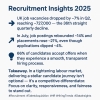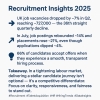UK unemployment fell to its lowest level since January 1975 in the three months to October this year.
The number of people out of work fell by 13,000 to 1.281 million, Office for National Statistics (ONS) figures show.
The employment rate rose to an all-time high of 76.2%, with an increase of 24,000 taking the number of people in work up to a total of 32.8 million.
However, wage growth, excluding bonuses, slowed to 3.5% from 3.6% from July to September.
ONS head of labour market David Freeman said: "While the estimate of the employment rate nudged up in the most recent quarter, the longer-term picture has seen it broadly flat over the last few quarters. However, unemployment among women has reached a new record low.
"Vacancies have fallen for 10 months in a row and are now below 800,000 for the first time in over two years.
"Pay is still increasing in real terms, but its growth rate has slowed in the last few months."
There were an estimated 794,000 vacancies in the UK for September to November 2019. That is 20,000 fewer than in the last quarter and 59,000 fewer than a year earlier.
The estimated employment rate for men was 80.4% and for women was 72%.
The increase in women's employment in recent years is partly a result of changes to their State Pension age, which has meant fewer retiring between the ages of 60 and 65.
The growing importance of the night-time economy
The jobs eight out of 10 Britons do
The slight slowdown in wage growth is party caused by the fact that in October 2018, some unusually high bonuses were paid to some workers. Bonuses given this October returned to more expected levels.
For October 2019, average regular pay, before tax and other deductions, was estimated at £509.68 per week.
Chancellor Sajid Javid said: "There's talent up and down this country - three-quarters of employment growth in the last year has been outside London and the South East.
"I'm looking forward to getting Brexit done and unleashing Britain's potential, levelling up opportunity across the country."
Tej Parikh, chief economist at the Institute of Directors, said: "The UK's jobs boom continues to be a big plus point for the economy, but it is slowly losing momentum.
"Businesses have shown a strong appetite to take on staff in recent years, and climbing employment levels have boosted household incomes, adding buoyancy to the economy. However, firms are now cutting back on new hires as it becomes harder to find the skills they need.
"Uncertainty and slowing global growth have also made businesses a bit more cautious in their recruitment plans, and vacancies are expected to continue falling into 2020."
Source - www.bbc.co.uk/news/
You want candidates who are passionate about what they do for a living, don't you?
Of course you do. But passion for a profession is tough to get a grip on. And like most subjective things, there's a whole lot of bulls**t going on in the world related to determining whether someone has passion for what they do.
But the need persists. You can find out whether the people you are interviewing have passion for what they do (or are simply paying the bills) through some of the following interview strategies:
1. Ask candidates how they stay up to date in their field. If you see a glut of reliance on professional training and formal activities that happen in company time, you're probably not dealing with passion. Pro tip – if they give you a source they invest time in, dig into the last meaningful thing they got from it. As at least 5 questions – let's see how deep the person in front of you actually is.
2. Ask a candidate to give you a big question in their field they'd like to solve and why. Ask them what they've done related to starting to figure out the answer. Probe hard on the answers they give. See any creativity? You might have passion. See lots of glittering generalities? That's fake passion.
3. Ask a candidate how they find others in their profession to connect with, and how often they connect with others in their field outside their company.
What do they talk about? What type of information is exchanged? How have those connections helped them?
4. Ask Motivational Fit questions – When have your been most satisfied in your work at Company X? Least Satisfied? If the answers show a consistent theme of talking about BS factors rather than a clear line towards being able to do interesting work related to their field, it's hard to project them as passionate in their field.
And no Skippy – passion for something that's not work related doesn't count for you as an interviewer – it's nice to know you run marathons, but it has no impact on things that emulate from passion for the profession – continuous improvement, innovation, etc. It does tell me you're not going to cost a lot for healthcare, though. Thanks!
Start asking questions that give you line of sight for professional passion on your candidates. No fake passion or passion that doesn't produce results.
Or just keep looking for people that want to make the donuts and go home.
Article from https://fistfuloftalent.com/










